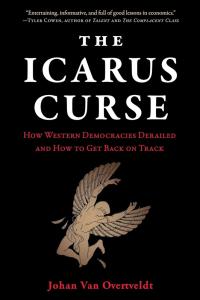
The Western world is confronted by challenges the enormity of which has not been seen since the Second World War. We stagger to face these challenges in a state of policy exhaustion, budgetary as well as monetary. Only courageous and decisive reform can turn the tables in our favor.
Within a few days my new book will be published. Its full title is The Icarus Curse. How Democracies Derailed and How to Get Back on Track (Agate Publishing, Chicago. Order details below). The Greek mythological figure Icarus tried to escape from exile on an island by flying as a bird, with feathers waxed to his body. Initially the flying went well but, despite his father’s warnings, Icarus became careless. Overconfident, he flew too close to the sun and the wax melted. Icarus crashed, as immortalized by Peter Bruegel The Old in the painting of the same name.
Arcing towards the sun
A large part of the Western world finds itself arcing towards the sun. As I argue in The Icarus Curse, it is the political abuse of the Keynesian heritage that is the fundamental driving force behind this disturbing development. In the years after the Second World War, the prescriptions outlined by John Maynard Keynes to fight a depression were turned by his followers into a manual for the day-to-day management of the economy. By the 1970s economists had concluded that this approach did not work, but politicians ignored them and kept going. Budget deficits were considered defendable, rising debt was dismissed as a concern and when things got complicated central bankers anyway came to the rescue. Politicians were emboldened, overconfident. Just throw money at the problem, so the mainstream thought went, and things will work themselves out in the end. The political elite in many Western countries were ensnared by the Icarus Curse.
Escalating expectations
Liberated from stringent budget constraints, Western politicians escalated their promises towards the population. As a consequence, the expectations of citizens escalated too. A doom loop resulted from the interaction between relentlessly augmented promises (more health care, more education, higher pensions, more subsidies …) and fired-up expectations. When promises remained increasingly unfulfilled due to the lack of real policy space, frustration and anger rose. As a consequence, more and more Western citizens felt attracted to populist and illiberal political leaders.
Policy exhaustion
One of the many consequences of the almost systematic political abuse of the heritage of John Maynard Keynes is that the Western world finds itself in a state of what I label in The Icarus Curse as policy exhaustion. On top of decades of the political abuse just described, the Great Financial Crisis of 2008, the Covid 19 pandemic of the early 2020s and Russia’s war against Ukraine have stretched the budgetary and monetary policy room to the limit.
Borio
Exactly this theme of policy exhaustion was a major discussion in a recent lecture by Claudio Borio, respected head of the Monetary and Economic Department of the Basel-based Bank for International Settlements (BIS). The BIS is the institution where the major central bankers of the world gather regularly. Claudio Borio holds an excellent reputation as a most intelligent, often intriguing macro-economic researcher. Borio has been a pioneer for the analysis of the financial boom and bust cycle as the main driver of the business cycle in the real economy. He has been consistently critical of the very accommodative monetary policies pursued in the past by most Western central banks. Given his position at the BIS he became well-versed in the art of crafting a tongue-in-cheek formulation of that critical attitude.
A few weeks ago, Borio elaborated in his lecture at the prestigious Official Monetary and Financial Institutions Forum (OMFIF) in London on, amongst others, the “historic loss in the room for policy manoeuvre over successive business and financial cycles”. The pure focus of most Western central banks on inflation targeting, so Borio argued, has been a main driver of monetary policies that gave rise to longer-term damages to the real economy and increasing fragility in the financial sphere. While inflation was held down by worldwide globalization (the rise of China and India, the implosion of the Soviet empire), Western central banks continuously pushed on the monetary speed pedal in order to get inflation to the targeted 2%. As also elaborately argued in my 2022 book The Mystic Hand, these persistently expansionary monetary policies created several unintended consequences. This fueled not only financial instability but also inequality and lack of much needed structural reforms.
Debt trap
Monetary policy focusing on inflation targeting -- with the target for most central banks being an annual increase in the price index of goods and services of around 2% -- also contributed importantly to what Borio describes as the “debt trap”. Lower interest rates have been “encouraging further indebtedness which would in turn make it harder to raise rates without causing damage to the economy”. In the public sector in most Western Countries we saw, so Borio continues, “even pre-Covid, government debt-to-GDP ratios had reached historical peaks across the world, in line with World War II levels. The belief that interest rates would remain low as far as the eye could see no doubt played a significant role”.
Quartet of chaos
With policy options clearly in or close to the phase of exhaustion, huge challenges are presently on the table for policymakers in the Western world. A limited list of those challenges includes the war in Ukraine and the accompanying threat of Vladimir Putin’s chaos-oriented intentions, the anti-Western and anti-democratic drive orchestrated by China as leader of what The Economist labeled as “the quartet of chaos” (China, Russia, Iran, North Korea), the corresponding need to beef up defense capabilities, the continued need to address climate change, illegal immigration and aging of the population.
The way out
The way out of the impasse of policy exhaustion leads through the avenue of enhanced economic growth in combination with careful re-examination of government spending. It is not first of all money that is needed to achieve higher economic growth. The best contribution monetary policy can bring to economic growth is price stability. Monetary policies endangering price stability will also endanger economic growth. Price stability and augmented economic growth will allow central bankers to get out of the corner of limited policy options, i.e. policy exhaustion.
Political courage
For EU member states it is vital for the re-igniting of economic growth to avoid fragmentation of the internal market and address persistent taboos, which have hitherto prevented strengthening the construct. Also imperative is real progress towards a capital markets union within the EU. Such policy actions do not require money, only political courage and perseverance. The same goes for many reforms member states can pursue for their labor markets, energy markets and tax systems to become more growth friendly.
The political elite of the past decades – of which I am part – brought about the state of policy exhaustion at the end of the first quarter of the 21st century. This exhaustion creates a precarious situation for western democracies because of the manifold challenges facing us and their magnitudes. It is up to the present political elite to walk away from the counterproductive policies of the past and do better. Former European Commissioner Jean-Claude Juncker once said that “we all know what to do but we don’t know how to get reelected once we have done it”. The first part of the quote is true, the second part remains to be seen but I am quite optimistic. Moreover, there is no longer a realistic alternative.
The book
The Icarus Curse. How Democracies Derailed and How to Get Back on Track can be ordered from:

Usefull links & downloads
You may also be interested in

The Draghi & Schnabel Truth on Trump
The actions of the new Trump administration will have a major impact beyond America’s borders, not least in Europe. Nevertheless, Europe should stop mourning the Democrats’ loss and do what it must do, whatever Trump’s intentions. Money is not the most pressing issue on Europe’s priority list, so Mario Draghi very correctly argues.

A “neck breaking” exercise
Is the ECB arriving to a Catch 22 situation? Arguments favoring the recent rate cuts must be weighed against arguments going in the other direction. A still fragile inflation outlook and a front of maturing debt clouds the picture.